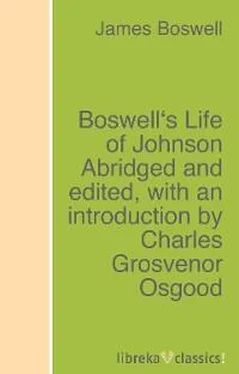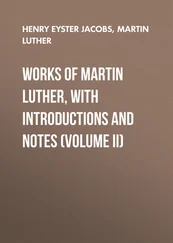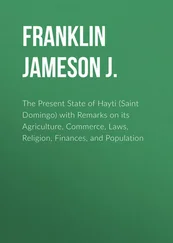James Boswell - Boswell's Life of Johnson Abridged and edited, with an introduction by Charles Grosvenor Osgood
Здесь есть возможность читать онлайн «James Boswell - Boswell's Life of Johnson Abridged and edited, with an introduction by Charles Grosvenor Osgood» — ознакомительный отрывок электронной книги совершенно бесплатно, а после прочтения отрывка купить полную версию. В некоторых случаях можно слушать аудио, скачать через торрент в формате fb2 и присутствует краткое содержание. Жанр: unrecognised, на английском языке. Описание произведения, (предисловие) а так же отзывы посетителей доступны на портале библиотеки ЛибКат.
- Название:Boswell's Life of Johnson Abridged and edited, with an introduction by Charles Grosvenor Osgood
- Автор:
- Жанр:
- Год:неизвестен
- ISBN:нет данных
- Рейтинг книги:4 / 5. Голосов: 1
-
Избранное:Добавить в избранное
- Отзывы:
-
Ваша оценка:
- 80
- 1
- 2
- 3
- 4
- 5
Boswell's Life of Johnson Abridged and edited, with an introduction by Charles Grosvenor Osgood: краткое содержание, описание и аннотация
Предлагаем к чтению аннотацию, описание, краткое содержание или предисловие (зависит от того, что написал сам автор книги «Boswell's Life of Johnson Abridged and edited, with an introduction by Charles Grosvenor Osgood»). Если вы не нашли необходимую информацию о книге — напишите в комментариях, мы постараемся отыскать её.
Boswell's Life of Johnson Abridged and edited, with an introduction by Charles Grosvenor Osgood — читать онлайн ознакомительный отрывок
Ниже представлен текст книги, разбитый по страницам. Система сохранения места последней прочитанной страницы, позволяет с удобством читать онлайн бесплатно книгу «Boswell's Life of Johnson Abridged and edited, with an introduction by Charles Grosvenor Osgood», без необходимости каждый раз заново искать на чём Вы остановились. Поставьте закладку, и сможете в любой момент перейти на страницу, на которой закончили чтение.
Интервал:
Закладка:
At this time I think he had published nothing with his name, though it was pretty generally known that one Dr. Goldsmith was the authour of An Enquiry into the present State of polite Learning in Europe, and of The Citizen of the World, a series of letters supposed to be written from London by a Chinese. No man had the art of displaying with more advantage as a writer, whatever literary acquisitions he made. 'Nihil quod tetigit non ornavit.' His mind resembled a fertile, but thin soil. There was a quick, but not a strong vegetation, of whatever chanced to be thrown upon it. No deep root could be struck. The oak of the forest did not grow there; but the elegant shrubbery and the fragrant parterre appeared in gay succession. It has been generally circulated and believed that he was a mere fool in conversation; but, in truth, this has been greatly exaggerated. He had, no doubt, a more than common share of that hurry of ideas which we often find in his countrymen, and which sometimes produces a laughable confusion in expressing them. He was very much what the French call un etourdi, and from vanity and an eager desire of being conspicuous wherever he was, he frequently talked carelessly without knowledge of the subject, or even without thought. His person was short, his countenance coarse and vulgar, his deportment that of a scholar aukwardly affecting the easy gentleman. Those who were in any way distinguished, excited envy in him to so ridiculous an excess, that the instances of it are hardly credible. When accompanying two beautiful young ladies* with their mother on a tour in France, he was seriously angry that more attention was paid to them than to him; and once at the exhibition of the Fantoccini in London, when those who sat next him observed with what dexterity a puppet was made to toss a pike, he could not bear that it should have such praise, and exclaimed with some warmth, 'Pshaw! I can do it better myself.'
He boasted to me at this time of the power of his pen in commanding money, which I believe was true in a certain degree, though in the instance he gave he was by no means correct. He told me that he had sold a novel for four hundred pounds. This was his Vicar of Wakefield. But Johnson informed me, that he had made the bargain for Goldsmith, and the price was sixty pounds. 'And, Sir, (said he,) a sufficient price too, when it was sold; for then the fame of Goldsmith had not been elevated, as it afterwards was, by his Traveller; and the bookseller had such faint hopes of profit by his bargain, that he kept the manuscript by him a long time, and did not publish it till after The Traveller had appeared. Then, to be sure, it was accidentally worth more money.
Mrs. Piozzi and Sir John Hawkins have strangely misstated the history of Goldsmith's situation and Johnson's friendly interference, when this novel was sold. I shall give it authentically from Johnson's own exact narration:—'I received one morning a message from poor Goldsmith that he was in great distress, and as it was not in his power to come to me, begging that I would come to him as soon as possible. I sent him a guinea, and promised to come to him directly. I accordingly went as soon as I was drest, and found that his landlady had arrested him for his rent, at which he was in a violent passion. I perceived that he had already changed my guinea, and had got a bottle of Madeira and a glass before him. I put the cork into the bottle, desired he would be calm, and began to talk to him of the means by which he might be extricated. He then told me that he had a novel ready for the press, which he produced to me. I looked into it, and saw its merit; told the landlady I should soon return, and having gone to a bookseller, sold it for sixty pounds. I brought Goldsmith the money, and he discharged his rent, not without rating his landlady in a high tone for having used him so ill.'
My next meeting with Johnson was on Friday the 1st of July, when he and I and Dr. Goldsmith supped together at the Mitre. I was before this time pretty well acquainted with Goldsmith, who was one of the brightest ornaments of the Johnsonian school. Goldsmith's respectful attachment to Johnson was then at its height; for his own literary reputation had not yet distinguished him so much as to excite a vain desire of competition with his great Master. He had increased my admiration of the goodness of Johnson's heart, by incidental remarks in the course of conversation, such as, when I mentioned Mr. Levet, whom he entertained under his roof, 'He is poor and honest, which is recommendation enough to Johnson;' and when I wondered that he was very kind to a man of whom I had heard a very bad character, 'He is now become miserable; and that insures the protection of Johnson.'
He talked very contemptuously of Churchill's poetry, observing, that 'it had a temporary currency, only from its audacity of abuse, and being filled with living names, and that it would sink into oblivion.' I ventured to hint that he was not quite a fair judge, as Churchill had attacked him violently. JOHNSON. 'Nay, Sir, I am a very fair judge. He did not attack me violently till he found I did not like his poetry; and his attack on me shall not prevent me from continuing to say what I think of him, from an apprehension that it may be ascribed to resentment. No, Sir, I called the fellow a blockhead at first, and I will call him a blockhead still. However, I will acknowledge that I have a better opinion of him now, than I once had; for he has shewn more fertility than I expected. To be sure, he is a tree that cannot produce good fruit: he only bears crabs. But, Sir, a tree that produces a great many crabs is better than a tree which produces only a few.'
Let me here apologize for the imperfect manner in which I am obliged to exhibit Johnson's conversation at this period. In the early part of my acquaintance with him, I was so wrapt in admiration of his extraordinary colloquial talents, and so little accustomed to his peculiar mode of expression, that I found it extremely difficult to recollect and record his conversation with its genuine vigour and vivacity. In progress of time, when my mind was, as it were, strongly impregnated with the Johnsonian oether, I could, with much more facility and exactness, carry in my memory and commit to paper the exuberant variety of his wisdom and wit.
At this time MISS Williams, as she was then called, though she did not reside with him in the Temple under his roof, but had lodgings in Bolt-court, Fleet-street, had so much of his attention, that he every night drank tea with her before he went home, however late it might be, and she always sat up for him. This, it may be fairly conjectured, was not alone a proof of his regard for HER, but of his own unwillingness to go into solitude, before that unseasonable hour at which he had habituated himself to expect the oblivion of repose. Dr. Goldsmith, being a privileged man, went with him this night, strutting away, and calling to me with an air of superiority, like that of an esoterick over an exoterick disciple of a sage of antiquity, 'I go to Miss Williams.' I confess, I then envied him this mighty privilege, of which he seemed so proud; but it was not long before I obtained the same mark of distinction.
On Tuesday the 5th of July, I again visited Johnson.
Talking of London, he observed, 'Sir, if you wish to have a just notion of the magnitude of this city, you must not be satisfied with seeing its great streets and squares, but must survey the innumerable little lanes and courts. It is not in the showy evolutions of buildings, but in the multiplicity of human habitations which are crouded together, that the wonderful immensity of London consists.'
On Wednesday, July 6, he was engaged to sup with me at my lodgings in Downing-street, Westminster. But on the preceding night my landlord having behaved very rudely to me and some company who were with me, I had resolved not to remain another night in his house. I was exceedingly uneasy at the aukward appearance I supposed I should make to Johnson and the other gentlemen whom I had invited, not being able to receive them at home, and being obliged to order supper at the Mitre. I went to Johnson in the morning, and talked of it as a serious distress. He laughed, and said, 'Consider, Sir, how insignificant this will appear a twelvemonth hence.'—Were this consideration to be applied to most of the little vexatious incidents of life, by which our quiet is too often disturbed, it would prevent many painful sensations. I have tried it frequently, with good effect. 'There is nothing (continued he) in this mighty misfortune; nay, we shall be better at the Mitre.'
Читать дальшеИнтервал:
Закладка:
Похожие книги на «Boswell's Life of Johnson Abridged and edited, with an introduction by Charles Grosvenor Osgood»
Представляем Вашему вниманию похожие книги на «Boswell's Life of Johnson Abridged and edited, with an introduction by Charles Grosvenor Osgood» списком для выбора. Мы отобрали схожую по названию и смыслу литературу в надежде предоставить читателям больше вариантов отыскать новые, интересные, ещё непрочитанные произведения.
Обсуждение, отзывы о книге «Boswell's Life of Johnson Abridged and edited, with an introduction by Charles Grosvenor Osgood» и просто собственные мнения читателей. Оставьте ваши комментарии, напишите, что Вы думаете о произведении, его смысле или главных героях. Укажите что конкретно понравилось, а что нет, и почему Вы так считаете.












